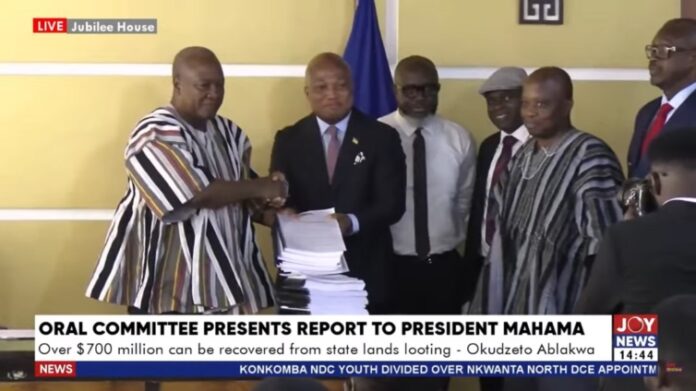The Vice President of IMANI Africa has urged political actors and policymakers to approach the NDC’s “Operation Recover All Loot” (ORAL) as a structured government policy rather than a mere political promise, stressing the need for clear targets and measurable outcomes.
Bright Simons, speaking on Joy News’ Newsfile on Saturday, February 15, stressed the widespread public support for ORAL, cautioning political figures, particularly from the New Patriotic Party (NPP), against underestimating its appeal.
“We have to be very clear that a lot of people in this country are excited about it, and I think those political actors who’ve made it a habit to try and caricature it and make fun of it are not attuned to public sentiment,” he said.
According to him, the NPP’s dismissive stance towards ORAL and other economic concerns reflects a broader issue of political disconnect.
“I think on the NPP side in particular, there is this tendency to be out of touch with public sentiment, and you have to watch it going into the campaign,” he observed.
He recounted hearing senior NPP figures downplay inflation concerns, arguing that such dismissiveness ignores the lived realities of Ghanaians.
“I had occasion to listen to some of their most senior people talk about the fact that, you know, Ghana is not Accra, and all this inflation talk is nonsense. And I’m like, do you know the actual regions that were suffering most from inflation? Savannah was number one,” he noted, highlighting the importance of data-driven governance.
Beyond its popularity, Bright Simons stressed the need to structure ORAL as a concrete policy initiative, complete with well-defined targets and performance metrics.
“If it’s a government policy, then measuring it effectively becomes critical. Because one of the big problems we have in policy-making in this country is that we can’t measure. So everybody throws their arms about, they do some PR, people get excited a little bit, and then we forget about what exactly they promised. And then we come back four-year cycle, same thing all over again: watch, rinse, repeat,” he lamented.
He proposed setting specific goals for ORAL to ensure accountability and effectiveness.
“When I said that if they can prosecute 50% of the cases, if they can secure 50% convictions, if of those 50%, they are willing to pay back, and through that effort, recoveries can be made, then, to my mind, you’ve done well,” Mr. Simons explained.
He clarified that his previous comments about a 12.5% recoverability rate were not predictions but rather a “stretch target” for policymakers to aim for.
Bright Simons also pointed out the need for clarity in assessing the extent of financial damage and recoverable amounts.
He noted discrepancies in figures cited by the government, with estimates ranging from $20.8 billion to $28.9 billion.
“Some people think what he [Mahama] has seen is that he can recover all $21.1 billion or $20.8 billion. What they were saying is that this is the damage they estimate from the cases they’ve examined. The fiscal damage to the country is not necessarily the recoverable target,” he explained.
He illustrated his point with specific cases, including alleged financial losses at the National Service Secretariat, where $4.5 billion in estimated harm does not necessarily translate to recoverable funds.
“If you take all the budgets of the National Service Secretariat since it was founded to date, and you added all that, and it only amounted to $4.5 billion, it would be significantly less,” he noted.
Similarly, he cast doubt on the feasibility of retrieving the full $1.5 billion linked to COVID-19 expenditures, given that much of it was distributed in the form of free water, electricity, and business loans.
“The fact that it was wasted does not otherwise mean, though, that you can use the criminal process to recover it,” he cautioned, stressing the legal complexities of asset recovery.
Bright Simons further stressed that certain cases, such as those involving the National Cathedral project, may offer clearer avenues for recovery due to identifiable contracts and expenditures.
However, he warned against oversimplification, highlighting Ghana’s weak track record in high-profile corruption prosecutions.
“To be able to recover through the criminal process, you must establish crime. Think of the matter in relation to the National Cathedral. Whether or not they will be able to get the money out of them is another matter. But at least you could make the case that the money was ill-spent,” he said.
He concluded by calling for a policy-oriented approach to ORAL, urging politicians and civil society to push for structured, evidence-based mechanisms that ensure accountability.
“If we wanted to spend in that way, the president, the Chief Justice, and the Speaker of Parliament should have agreed. That’s why I say we need proper policy design, not just rhetoric,” Bright Simons stated.
ALSO READ:

